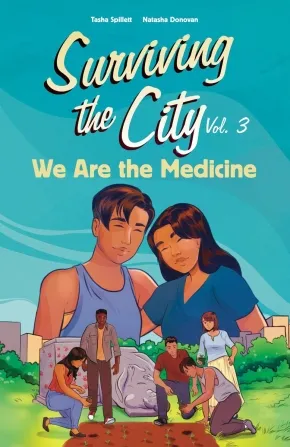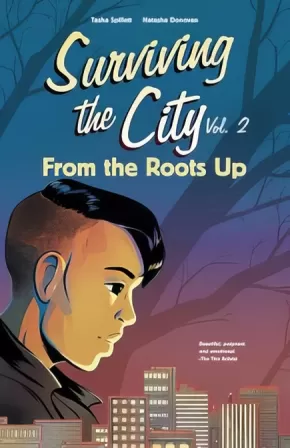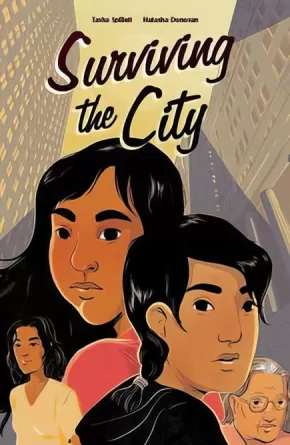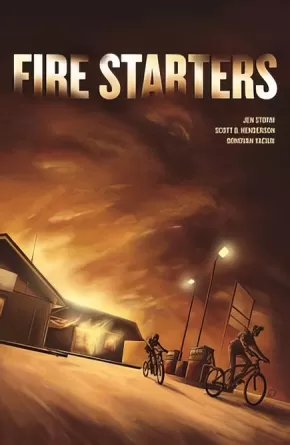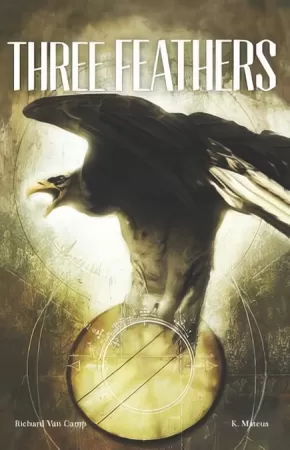
The Debwe Series
1
-
6
of
6 Results;
Sort By
Created in the spirit of the Anishinaabe concept debwe (to speak the truth), The Debwe Series is a collection of exceptional Indigenous writings from across Canada.
Included in this series are all types of works (fiction, nonfiction, graphic novels, etc.). Here, you will find graphic novels in the collection.
We Are the Medicine: Surviving the City Vol. 3
$21.95
Artists:
Format:
Paperback
Text Content Territories:
Indigenous Canadian; First Nations; Cree (Nehiyawak); Anishinaabeg;
ISBN / Barcode: 9781774921104
Synopsis:
Synopsis:
Miikwan and Dez are in their final year of high school. Poised at the edge of the rest of their lives, they have a lot to decide on. Miikwan and her boyfriend, Riel, are preparing for university, but Dez isn’t sure if that’s what they want for their future.
Grief and anger take precedence over their plans after the remains of 215 children are found at a former residential school in British Columbia. The teens struggle with feelings of helplessness in the face of injustice. Can they find the strength to channel their frustration into action towards a more hopeful future?
We Are the Medicine is the moving final volume of the best-selling Surviving the City series.
Reviews
"Tasha's graphic novel gives us an unflinching view of youth sovereignty and the reclamation of Indigenous philosophy and sacred spaces in Winnipeg's core. Guided by an Elder, the friends at the centre of the story confront uncomfortable truths that have sustained our colonial past, riding on the edge of emotions and activism to uphold the integrity of their ancestors. A must-read for all youth who want to build an equitable, just society." — Elder Albert McLeod, author of Between the Pipes
“A fantastic read for teens to learn about Indigenous issues through a clear and accurate representation.” — Youth Services Book Review
Educator & Series Information
Recommended for ages 12 to 18.
This is the third volume in the Surviving the City graphic novel series, which is also part of the Debwe Series.
Surviving the City is a contemporary graphic novel series about young Indigenous women navigating their way in an urban environment. It includes:
Surviving the City
From the Roots Up
We Are the Medicine
A Teacher Guide is available: Surviving the City Teacher Guide: Exploring Identity, Allyship, and Social Action for Meaningful Change in Grades 7-12
Recommended in the Indigenous Books for Schools catalogue as a valuable resource for English Language Arts and Social Studies in grades 8 to 12.
Caution: This work's topics include residential schools, death, violence, police brutality, and racism.
Themes: Coming of Age, Community, Connection to Culture, Healing, Residential Schools.
Additional Information
64 pages | 6.50" x 10.00" | Paperback
A Blanket of Butterflies - 2nd Edition
$21.95
Artists:
Format:
Paperback
Text Content Territories:
Indigenous Canadian; First Nations; Dene; Tlicho (Dogrib);
ISBN / Barcode: 9781774920404
Synopsis:
Synopsis:
No one knows how a suit of samurai armour ended up in the Fort Smith museum. When a mysterious stranger turns up to claim it, Sonny, a young Tłı̨chǫ Dene boy, is eager to help.
Shinobu has travelled to Fort Smith, NWT, to reclaim his grandfather’s samurai sword and armour. But when he discovers that the sword was lost in a poker game, he must confront the man known as Benny the Bank. Along the way, Shinobu must rely on unlikely heroes—Sonny, his grandmother, and a visitor from the spirit world. Together, they face Benny and his men, including the giant they call Flinch.
Will Shinobu be able to regain the lost sword and, with it, his family’s honour? Can Sonny and his grandmother help Shinobu while keeping the peace in their community?
Now in full colour, this new edition includes additional background information and cultural context. Learn about the real-life inspiration behind the story and the intersections between Indigenous and Japanese Canadian experiences during the Second World War.
Educator & Series Information
This work is part of the Debwe Series, which is created in the spirit of the Anishinaabe concept debwe (to speak the truth), The Debwe Series is a collection of exceptional Indigenous writings from across Canada.
This book is part of the The Spirit of Denendeh series.
The publisher recommends this title for ages 15 to 18.
Additional Information
56 pages | 6.50" x 10.00" | 2nd Edition | Paperback
From the Roots Up: Surviving the City Vol. 2
$21.95
Artists:
Format:
Paperback
Text Content Territories:
Indigenous Canadian; First Nations; Anishinaabeg; Cree (Nehiyawak);
ISBN / Barcode: 9781553798989
Synopsis:
Synopsis:
Dez and Miikwan’s stories continue in this sequel to Surviving the City.
Dez’s grandmother has passed away. Grieving, and with nowhere else to go, she’s living in a group home. On top of everything else, Dez is navigating a new relationship and coming into her identity as a Two-Spirit person.
Miikwan is crushing on the school’s new kid Riel, but doesn’t really understand what Dez is going through. Will she learn how to be a supportive ally to her best friend?
Elder Geraldine is doing her best to be supportive, but she doesn’t know how to respond when the gendered protocols she’s grown up with that are being thrown into question.
Will Dez be comfortable expressing her full identity? And will her community relearn the teachings and overcome prejudice to celebrate her for who she is?
Educator & Series Information
Recommended for ages 12 to 18.
This is the second volume in the Surviving the City graphic novel series, which is also part of the Debwe Series.
Surviving the City is a contemporary graphic novel series about young Indigenous women navigating their way in an urban environment. It includes these books:
Surviving the City
From the Roots Up
We Are the Medicine
A Teacher Guide is available: Surviving the City Teacher Guide: Exploring Identity, Allyship, and Social Action for Meaningful Change in Grades 7-12
Additional Information
64 pages | 6.50" x 10.00"
Surviving the City Vol. 1
$21.95
Artists:
Format:
Paperback
Text Content Territories:
Indigenous Canadian; First Nations; Cree (Nehiyawak); Anishinaabeg;
ISBN / Barcode: 9781553797562
Synopsis:
Synopsis:
Tasha Spillett’s graphic novel debut, Surviving the City, is a story about womanhood, friendship, colonialism, and the anguish of a missing loved one.
Miikwan and Dez are best friends. Miikwan is Anishinaabe; Dez is Inninew. Together, the teens navigate the challenges of growing up in an urban landscape – they’re so close, they even completed their Berry Fast together. However, when Dez’s grandmother becomes too sick, Dez is told she can’t stay with her anymore. With the threat of a group home looming, Dez can’t bring herself to go home and disappears. Miikwan is devastated, and the wound of her missing mother resurfaces. Will Dez’s community find her before it’s too late? Will Miikwan be able to cope if they don’t?
Awards
- Winner of the 2019 Indigenous Voices Award for Works in an Alternative Format
- Co-winner of the Eileen McTavish Sykes Award for Best First Book by a Manitoba Author
- Winner of the Manuela Dias Design and Illustration Award, Graphic Novel category
Educator & Series Information
Recommended Grades: 7-12.
This graphic novel is part of the Surviving the City series, which is also part of the Debwe Series.
The Surviving the City series includes these titles:
- Surviving the City
- From the Roots Up
- We Are the Medicine
Recommended in the Canadian Indigenous Books for Schools 2019-2020 resource list for grades 10 to 12 for English Language Arts and Social Studies.
This book could be triggering for some readers as it contains mature content and focuses on issues such as Missing and Murdered Indigenous Women and Girls.
A Teacher Guide is available: Surviving the City Teacher Guide: Exploring Identity, Allyship, and Social Action for Meaningful Change in Grades 7-12
Additional Information
56 pages | 6.50" x 10.00"
Fire Starters
$18.95
Artists:
Format:
Paperback
Text Content Territories:
Indigenous Canadian; First Nations;
ISBN / Barcode: 9781553796855
Synopsis:
Synopsis:
Looking for a little mischief after finding an old flare gun, Ron and Ben suddenly find themselves in trouble when the local gas bar on Agamiing Reserve goes up in flames, and they are wrongly accused of arson by the sheriff’s son. As the investigation goes forward, community attitudes are revealed, and the truth slowly comes to light.
Reviews
"Storm's story is a very thoughtful look at the two systems of justice. The Native boys in the White system, being interrogated is a stark contrast to what the White boy experiences in the Native system of justice. It points to the path Storm is looking for: how a community can heal, rather than how it could punish and inflict more harm on people... I recommend Jen Storm's Fire Starters. There's a lot to study, think about, and of course, talk about." -- Debbie Reese, American Indians in Children's Literature
"Fire Starters reminds readers of the many perspectives involved in reconciliation. The story moves beyond Ron and Ben’s experiences as aboriginal teens poorly treated by a white community to include the experiences of law enforcement officers, family members, and even the arsonists themselves. Complementing the fast-paced plot, Henderson’s artwork is drawn from a wide variety of perspectives, and Yaciuk’s moody colours suit the rising tension experienced by all characters. A cautionary tale about the consequences of prejudice and racism, Fire Starters is a valuable addition to conversations about the importance of reconciliation and the power of the truth." -- Roseanne Gauthier, National Reading Campaign
Educator & Series Information
Recommended Grades: 6-9
Fire Starters is one book in The Debwe Series. This series features exceptional Indigenous writing from across Canada.
Three Feathers
$18.95
Artists:
Format:
Paperback
Text Content Territories:
Indigenous Canadian;
ISBN / Barcode: 9781553795360
Synopsis:
Synopsis:
Three young men—Flinch, Bryce, and Rupert—have vandalized their community and are sent by its Elders to live nine months on the land as part of the circle sentencing process. There, the young men learn to take responsibility for their actions and acquire the humility required to return home. But, when they do return, will they be forgiven for what they’ve done?
Three Feathers explores the power and grace of restorative justice in one Northern community and the cultural legacy that can empower future generations.
Three Feathers is the third title in The Debwe Series. Created in the spirit of the Anishinaabe concept debwe (to speak the truth), The Debwe Series is a collection of exceptional Aboriginal writings from across Canada.
Reviews
"Three Feathers is a graphic novel illustrated by stark, black and white images. Many of the frames have no captioning, inviting the reader to intuit the narrative. K. Mateus, the illustrator, makes imaginative use of Aboriginal symbols and motifs in this 48 page book; when Gabe is attacked, demonic figures shadow the background, and when Bryce rails at the members of the community sentencing circle, the image of an angry wildcat snarls behind him." - CM Magazine
Educator & Series Information
Grades 10-12 BC English First Peoples Resource for units on Childhood and Place-Conscious Learning.
Recommended for grades 9 to 12.
This book is part of The Debwe Series, which features exceptional Indigenous writings from across Canada.
This book is available in French: Trois Plumes
Additional Information
48 pages | 6.50" x 10.00"
Sort By

